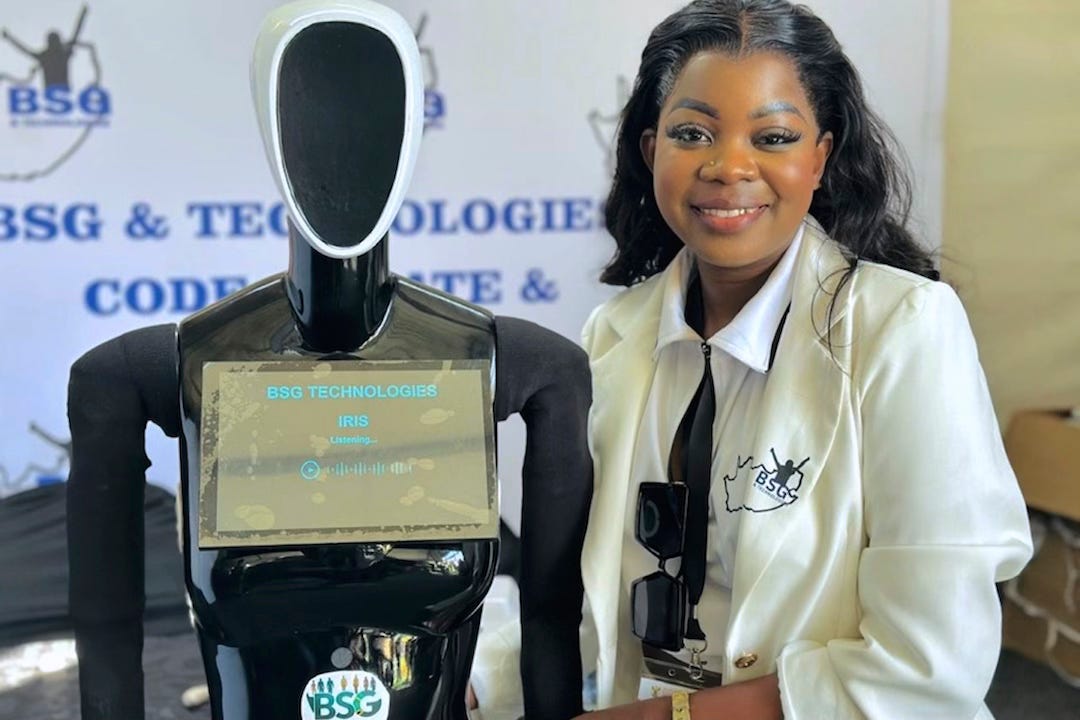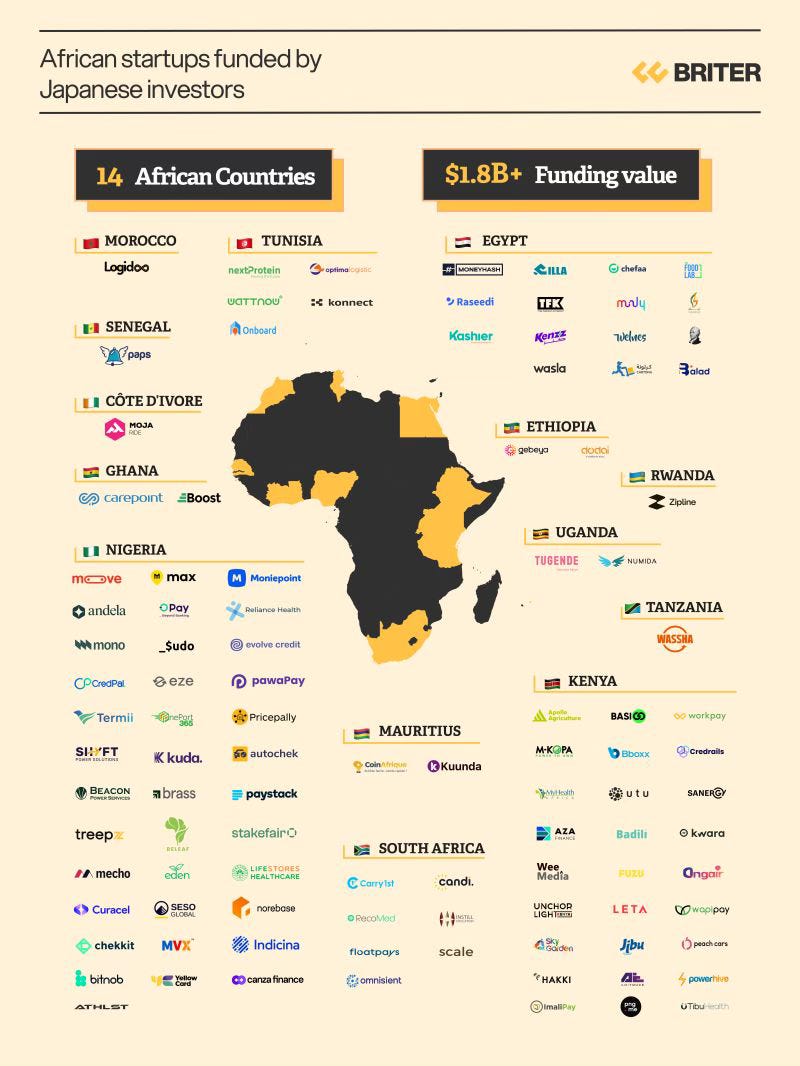IRIS edubot teaches SA kids; build starts on Côte d’Ivoire Tier III DC
Weekly News Digest ...
Good morning, and welcome to this week’s issue of Africa AI News – Weekly News Digest.
It seems the new fad is getting a sci-fi-looking manikin and screwing on some wheels, putting a tablet on the front with a Wi-Fi connection out the back and calling it an AI robot. Good thing? Bad thing? Will people interact more readily with an AI-robot than a laptop or phone-based AI chatbot? Time will tell — anthropomorphising high-tech does make it feel more accessible, at least in the beginning. The down-side is potentially skewing people’s perceptions of what they’re dealing with, engendering trust through cool styling, rather than applying responsible guard-rails and oversight.
Why be such a downer about a fun use of tech? Because any number of experts are raising concerns about the dangers of a laissez faire approach to rapidly adopting advanced (and poorly understood) technology. This week we feature an analysis by a large Kenyan bank that is concerned about AI use in credit scoring and similar applications. Real people could be hurt, or whole communities predated on for their valuable data (and no, this is not a props for the absurd premise of the new War of the Worlds remake about aliens that eat our data for lunch).
But even with warnings ringing in our ears, this week we cover some important AI applications, from fighting bank fraud to improving tax collection.
On with this week’s issue!
/Roger
Applications
South Africa launches AI teaching robot IRIS
#SouthAfrica #applications #education — Deputy Science Minister Nomalungelo Gina unveiled IRIS, South Africa’s first AI teaching robot. Developed by Thandoh Gumede from BSG Technologies, IRIS can teach Grades R to tertiary, communicate in 11 languages, and respond via voice, offering an interactive classroom experience to improve learning outcomes. (Times Live)
Ghana to develop AI robots for hospital diagnosis
#Ghana #applications #publichealth — Ghana will begin developing AI-powered robots to support healthcare delivery and improve diagnosis, presidency Chief of Staff Julius Debrah announced at the China–West Africa Medical Health Expo. The project, in partnership with the Korle-Bu and 37 Military hospitals, aims to reduce strain on doctor–patient resourcing and extend services to rural areas. (Modern Ghana)
Mozambique puts AI at core of tax reform
#Mozambique #applications #tax — The 2028 tax transformation agenda will harness AI for compliance, anomaly detection, and predictive auditing. Tools include NLP for document review and fraud detection algorithms, and machine learning for real-time monitoring, forensic analytics, and digital twin modelling to simulate tax policy impacts. Reforms target higher efficiency and compliance by corporates. (VATCalc)
Ethiopia’s central bank uses AI to fight fraud
#Ethiopia #applications #banking — The National Bank of Ethiopia has rolled out AI tools to detect suspicious transactions and illicit flows. Governor Mamo Mihertu said the move strengthens oversight of banks, fintechs, and cross-border funds amid a broader crackdown on money laundering. (Shega)
Tunisia launches Tartib 2.0 for project selection
#Tunisia #applications #e-government — Tunisia’s Ministry of Economy and Planning has introduced Tartib 2.0, a mandatory digital tool from 2026 to evaluate public investment projects. (Agenzia Nova)
Google puts more AI in search with AI Mode
#Africa #GenAI - New agentic capabilities in AI Mode help Google search users get things done more easily, says Google, adding more advanced reasoning to the existing AI Overviews with the ability to go deeper through follow-up questions and helpful links to the web. It is being rolled out globally, including to most African countries. (Google blog)
Policy
CBK survey flags AI risks in credit scoring
#Kenya #policy #banking — Half of Kenya’s banks have yet to adopt AI, but most that do use it for credit decisions, raising ethical concerns. A Central Bank of Kenya survey warns that weak governance exposes institutions to systemic risks. In an analysis by Kenyan banking group DTB, stakeholders call for clear rules on fairness, explainability and human oversight to protect borrowers and strengthen financial inclusion. (Business Daily Africa)
Egypt pushes ethical AI frameworks at TICAD 9
#Africa #policy — At TICAD 9 (Tokyo International Conference on African Development), Egypt’s economic minsiter Rania Al-Mashat said Africa must adopt strong governance for AI to drive inclusive development. With over 60% of Africans under 25, she argued responsible use of digital technologies could add $180bn to GDP. Egypt has been central to shaping the AU’s Continental AI Strategy. (Amwal Al Ghad)
Intelligence firm Briter published a list of Japanese-funded African tech startups, revealing is that most are “traditional high tech” rather than AI-led, and with a very strong showing in Nigeria.
Nigeria warned AI growth at risk without policy fixes
#Nigeria #policy — Nigeria’s AI adoption faces major hurdles despite a projected $434.4m market by 2026, according to a new report from economics think-tank CSEA. Poor infrastructure, high costs and weak data governance threaten progress, while experts warn government schemes like 3MTT and the National AI Centre risk underperformance without stronger policy and community engagement. (iAfrica)
Ghana, Lesotho push for joint African digital roadmap
#Africa #policy — Ghana and Lesotho have agreed to deepen collaboration on AI and digital transformation, with respective ministers Samuel Nartey George and Nthati Moorosi leading talks in Accra. The nations will form a virtual working group of African states, coordinated by Smart Africa, to align policy and strengthen collective bargaining with global tech firms. (Telecom Review Africa)
Big Tech boosts “AI for Good” in Africa — but with a dark side
#Africa #policy — Google, Microsoft, and Meta are ramping up AI projects for social impact across Africa, from wildfire prediction to health. Google alone pledged $37M this year. But experts warn the programs risk fueling dependency and data exploitation — Africa becoming a testing ground for AI models and a vast source of data collection in the U.S.-China tech rivalry. (Rest of World)
Education
Kenya launches project to train 100,000 officials
#Kenya #education #civilservice — Kenya has launched a government-backed initiative to provide AI skills to 100,000 public servants, beginning with a first cohort of 10,000. The Regional Centre of Competence project, supported by UNDP and Microsoft, aims to enhance efficiency, decision-making, and inclusivity in governance, while sharing expertise with 37 other African nations. (Africa Business Communities)
IEEE AI Caravan launches in Egypt with Coventry Cairo
#Egypt #CoEs — Coventry University Cairo, based at The Knowledge Hub in Cairo, has partnered with IEEE Computer Society on its six-month AI Caravan programme. The project will support knowledge-sharing and AI capacity building across Egypt, with academic leaders from local and global universities. (The Knowledge Hub Universities)
Malawi youth kick off AI training
#Malawi #skills — Over 50 young Malawians joined a 10-day “Empower AI, Build What’s Next” program in Lilongwe. Led by Mandela Washington Fellow Alfred Kankuzi with U.S. partners, the training blends AI basics, entrepreneurship, and leadership. (Nyasa Times)
Ethiopia unis open applications for joint PhD in AI
The Ethiopian Artificial Intelligence Institute (EAII) and Addis Ababa Science & Technology University (AASTU) have opened online applications for their joint PhD in Artificial Intelligence, aimed at easing the national shortage of AI experts. Applications are submitted via AASTU’s portal. (EAII LinkedIn)
DCs and CoEs
ST Digital to open Côte d’Ivoire’s first Tier III datacentre
#CôtedIvoire #datacentre — Start-up ST Digital is set to inaugurate its first Tier III datacentre in Côte d’Ivoire’s VITIB zone, Grand-Bassam, in late 2025. Positioned as the cornerstone of a sovereign cloud for French-speaking Africa, the facility aims to reduce reliance on foreign providers. Founder Anthony Same describes the launch as a continental turning point. (TechAfrica News)
Tech firms form AfricAI to boost local AI capacity
#Nigeria #CoEs — Lakeba Group (Australia), Next Digital (Nigeria), AqlanX (UAE), and Agentic Dynamic (Netherlands) have signed an MoU to launch AfricAI, a joint venture to strengthen Africa’s AI ecosystem. The project will train over 100 professionals by 2026, create a Centre of Excellence for AI and cybersecurity, and ensure data sovereignty by using Nigeria’s local infrastructure. (EQS News)
Hackathons and Competitions
Liberia unveils AI challenge to boost innovation
#Liberia #applications — Aiming to accelerate digital transformation, Liberia has introduced its 2025 Artificial Intelligence Challenge. The programme provides participants with mentorship, computational resources, and access to international expertise while promoting AI-driven solutions across governance, health and education. (TechReview Africa)
Funding
Hypeo AI raises funds to speed up influencer campaigns
#Morocco #CoEs — Moroccan startup Hypeo AI has secured backing from Renew Capital to transform influencer marketing operations. Its platform reduces reliance on spreadsheets and email, instead offering automated brand matching, performance analytics and support for both human and digital influencers in a growing creator marketplace. (Tech in Africa)
[ This newsletter was human fee fo fied and AI fummed ]



